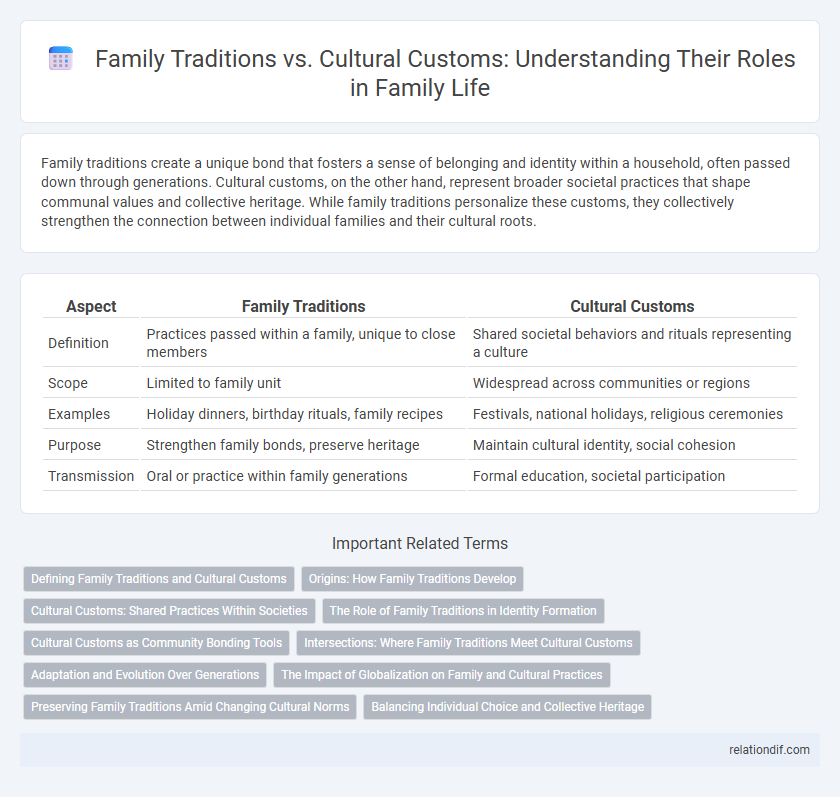Family traditions create a unique bond that fosters a sense of belonging and identity within a household, often passed down through generations. Cultural customs, on the other hand, represent broader societal practices that shape communal values and collective heritage. While family traditions personalize these customs, they collectively strengthen the connection between individual families and their cultural roots.
Table of Comparison
| Aspect | Family Traditions | Cultural Customs |
|---|---|---|
| Definition | Practices passed within a family, unique to close members | Shared societal behaviors and rituals representing a culture |
| Scope | Limited to family unit | Widespread across communities or regions |
| Examples | Holiday dinners, birthday rituals, family recipes | Festivals, national holidays, religious ceremonies |
| Purpose | Strengthen family bonds, preserve heritage | Maintain cultural identity, social cohesion |
| Transmission | Oral or practice within family generations | Formal education, societal participation |
Defining Family Traditions and Cultural Customs
Family traditions are specific practices and rituals passed down through generations within a family, often unique to that family unit and serving to strengthen bonds and create shared memories. Cultural customs encompass broader social behaviors and rituals that are widely observed within a particular community or ethnic group, reflecting shared history, values, and identity. Defining family traditions involves identifying personalized activities like holiday celebrations or weekly meals, while cultural customs include communal ceremonies such as weddings, festivals, or rites of passage.
Origins: How Family Traditions Develop
Family traditions develop through repeated practices and shared experiences passed down within a household, often rooted in specific cultural customs that reflect the heritage and values of ancestors. These traditions evolve as families adapt cultural rituals to their unique circumstances, blending historical customs with personal meaning. The origins of family traditions are deeply intertwined with cultural identity, serving as a living bridge between past generations and contemporary family life.
Cultural Customs: Shared Practices Within Societies
Cultural customs represent shared practices deeply embedded within societies, encompassing rituals, festivals, and daily habits passed down through generations. These customs foster a collective identity, reinforcing social bonds and providing a framework for communal behavior. Unlike individual family traditions, cultural customs reflect broader societal values and historical experiences that shape group dynamics.
The Role of Family Traditions in Identity Formation
Family traditions play a crucial role in shaping individual identity by providing a sense of belonging and continuity across generations. These customs, often passed down through storytelling, rituals, and celebrations, reinforce shared values and cultural heritage unique to each family. Incorporating family traditions into daily life helps individuals understand their roots and establish a stable foundation for personal and social development.
Cultural Customs as Community Bonding Tools
Cultural customs serve as powerful community bonding tools by fostering shared identities and collective memories within families. These customs, often passed down through generations, create a sense of belonging and continuity that transcends individual family units. Embracing cultural customs strengthens community ties and reinforces social cohesion among family members and their broader cultural groups.
Intersections: Where Family Traditions Meet Cultural Customs
Family traditions often serve as personalized expressions of cultural customs, creating unique intersections that strengthen identity and continuity across generations. These shared practices, whether seasonal celebrations, culinary rituals, or storytelling, embed cultural heritage within intimate family contexts, fostering a sense of belonging and resilience. Recognizing these overlaps enhances appreciation for how collective history and personal experiences shape social cohesion and cultural preservation.
Adaptation and Evolution Over Generations
Family traditions preserve unique practices passed down through generations, fostering a sense of identity and continuity within the household. Cultural customs, rooted in broader societal values, often influence these family rituals, leading to adaptation as families integrate new beliefs or respond to changing environments. Over time, this dynamic evolution ensures that both family traditions and cultural customs remain relevant, reflecting the changing identities and experiences of each generation.
The Impact of Globalization on Family and Cultural Practices
Globalization has reshaped family traditions and cultural customs by facilitating the exchange of values and practices across borders, leading to a blend of diverse cultural influences within households. Exposure to global media and increased migration have introduced new rituals and altered longstanding family norms, affecting intergenerational relationships and celebrations. This dynamic integration challenges traditional identities while fostering multicultural understanding and adaptive family practices worldwide.
Preserving Family Traditions Amid Changing Cultural Norms
Preserving family traditions amid evolving cultural customs ensures the continuity of unique values and shared memories across generations. These traditions serve as a resilient anchor, fostering identity and belonging despite societal shifts and globalization. Emphasizing personalized rituals strengthens family bonds while respecting the dynamic nature of cultural norms.
Balancing Individual Choice and Collective Heritage
Family traditions nurture individual identity by allowing personal expression within a shared heritage, fostering a sense of belonging and continuity. Cultural customs provide a framework that upholds collective values and strengthens intergenerational bonds through established rituals and celebrations. Balancing these elements enables families to honor their roots while adapting to contemporary lifestyles and diverse personal preferences.
family traditions vs cultural customs Infographic

 relationdif.com
relationdif.com